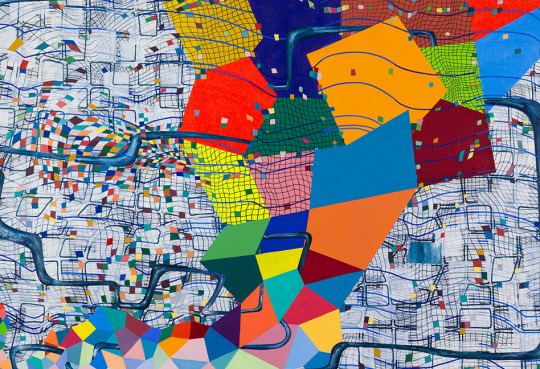NYFA Source | Hurricane Michael Resources Round-Up
Artists in Florida, Georgia, North Carolina, and Virginia: were you impacted by Hurricane Michael? Help is available.
Artists, we’re here to help you find your safety net. Aid is available in many forms, and we encourage you to apply, apply, apply. Though it can be a time-consuming process, the assistance offered by arts organizations and federal and local government agencies can help you rebuild, become more resilient, and return to your craft more quickly.
As you take care of the logistical aspects of your recovery, we hope you’ll prioritize self-care as well. A disaster can take a toll on your emotional health; don’t hesitate to reach out for help from organizations specializing in mental health and from your network.
Find Help Through NYFA Source
Additional information on Current Disaster Resources, Emergency Grants, Legal Resources, Public Assistance, and more can be found on NYFA Source, an online arts database with over 12,000 resources and opportunities for artists in all disciplines. Artists can also call the NYFA Source Hotline at (800) 232-2789, from Monday – Friday, 3:00 – 5:00 PM EST or email [email protected].
Government Assistance
Below are a few beginning steps to take as you seek government assistance, as well as resources to help you navigate the application processes.
First, check whether a Major Disaster Declaration has been issued for your state and/or county. This Declaration is tied to the availability of financial assistance and often includes key resources for your area. As FEMA’s Hurricane Michael Portal indicates, disasters have been declared in Florida, Georgia, and Alabama. Apply for Financial Assistance in Florida here; and apply for Financial Assistance in Georgia here. If and when Individual Assistance is approved for this disaster in Alabama, it will be displayed here.
Additionally, you can apply for Disaster Unemployment Assistance if you have become unemployed as a direct result of a Presidentially declared major disaster. Check the IRS for potential tax relief as well.
Loans and other assistance from the U.S. Small Business Administration (SBA) are available for specified counties in Florida. If you need help throughout these application processes, read CERF+’s Tips for Working with FEMA + SBA.
For other information, including what to do when returning home, avoiding charity fraud and false rumors, and more, check USA.gov.
Arts and Culture-Specific Resources
Check this post in the coming weeks for updates and added resources as the recovery process continues. Additionally, follow your local arts council on social media and connect with staff directly, as these organizations often offer resources and disaster assistance as they recover themselves.
- Actors Fund of America Emergency Assistance: For all performing artists and those working in entertainment. Eligible individuals can apply online for assistance or by mail in English and Spanish.
- Alliance of Artists Communities Emergency Funds for Individual Artists: The fund disburses mini-grants of up to $1,000 to artists who have already been accepted and scheduled for a residency, but who would not otherwise be able to participate due to a sudden change in circumstances.
- American Society of Journalists and Authors: Offers The Writers Emergency Assistance Fund, which helps established freelance writers who, because of illness, disability, a natural disaster, or an extraordinary professional crisis, are unable to work.
- Artists’ Charitable Fund: Artists who need financial assistance because of medical, fire, or other disaster should email Fund Coordinator Judy Archibald at [email protected] or call her at (970) 577-0509.
- Artists’ Fellowship, Inc. Financial Assistance: Provides emergency aid to professional fine artists and their families in times of sickness, natural disaster, bereavement, or unexpected extreme hardship.
- Authors League Fund: Provides assistance to professional writers and dramatists who find themselves in financial need because of medical or health-related problems, temporary loss of income, or other misfortune.
- Book Industry Charitable Foundation Immediate and Post Disaster Assistance: Assists with specific unforeseen emergency financial needs of a bookstore employee and their immediate family members living in the same household.
- Broadcasters Foundation of America: To be considered for the program, applicants must work in radio and/or television broadcasting and be in acute financial need due to hardships faced by a recent hurricane, flood, or other natural disaster.
- Carnegie Fund for Authors: Awards grants to published authors who are in need of emergency financial assistance.
- CERF+ Emergency Financial Relief: Provides financial assistance for eligible artists who work in craft disciplines, and tips for safety and studio protection for artists of all disciplines. Application guidelines are available in Spanish. CERF+ has also compiled a primer for the various stages of recovery for Hurricane Michael here.
- Dramatists Guild Fund Kesselring Emergency Grant: Awards one-time emergency grants to individual playwrights, lyricists, and composers in need of temporary financial assistance due to unexpected illness or extreme hardship.
- Foundation of the American Institute for Conservation of Historic and Artistic Works (FAIC): The free Emergency Response and Salvage Wheel Mobile App is designed for anyone in need of practical advice for saving collections or items in the first 48 hours after a disaster. Additionally, the National Heritage Responders Hotline can be reached 24/7 at (202) 661-8068 for conservation advice and referrals.
- Hero Initiative Grants: Provides assistance for eligible comic book writers, pencilers, inkers, colorists, or letterers on a work-for-hire basis.
- Jazz Foundation of America Jazz Musicians’ Emergency Fund: Provides housing assistance, pro bono medical care, and disaster relief for jazz musicians.
- Joan Mitchell Foundation Emergency Grant: Emergency support to artists working in the mediums of painting, sculpture, and/or drawing after natural or manmade disasters. Due to a high volume of requests in 2018, these grants are on a temporary hold and will resume accepting applications on January 1, 2019. The online form will reopen at that time, and Foundation staff will begin accepting and reviewing applications again in January. Applicants will receive a response within 1-2 months.
- Motion Picture and Television Fund: Provides temporary emergency financial assistance to qualified industry members experiencing financial hardship due to illness, disability, unemployment, or other reasons.
- MusiCares® Emergency Financial Assistance: This program is available to music people who have experienced an unavoidable emergency. Eligibility consists of documented employment in the music industry for at least five years or credited contribution to six commercially released recordings or videos. Artists in Florida, Georgia, and North Carolina can contact the MusiCares South Region Office at 1-877-626-2748. Artists in Virginia should contact the MusiCares East Region at 1-877-303-6962.
- Musicians Foundation Support: Provides aid for musicians of any genre in a time of acute need, due to personal, medical, dental, or family crisis, natural disaster, or other emergency situation.
- North Carolina Arts Council: The North Carolina Arts Council has gathered national and statewide resources for artists and arts organizations in response to Hurricane Florence, which are applicable to Hurricane Michael as well; find those resources here.
- PEN Writers’ Emergency Fund: Provides emergency funding for professional—published or produced—writers in acute, emergency financial crisis. The current deadline passed on October 15, 2018, but check their website for updates.
- Pioneers Assistance Fund (PAF): Serves members of the motion picture entertainment industry (exhibition, distribution, and trade services) who are encountering an illness, injury, or life-changing event. All assistance is intended to provide support during a recovery or adjustment period and lay the foundation for a lifetime of ongoing success.
- Rhythm & Blues Foundation Financial Assistance: Provides financial and medical assistance to Rhythm & Blues artists of the 1940s through the 1970´s, as well as a support system to help identify other sources of assistance.
- SAG-AFTRA Disaster Relief: The SAG-AFTRA Foundation and the SAG-AFTRA Motion Picture Players Welfare Fund have created a special Disaster Relief Fund to provide urgent financial support to members affected by the recent hurricane and flooding.
- The Adolph & Esther Gottlieb Foundation Emergency Grant: Provides interim financial assistance to qualified artists whose needs are the result of an unforeseen, catastrophic incident, and who lack the resources to meet that situation.
- The Haven Foundation: Gives financial assistance to provide temporary support needed to safeguard and sustain the careers of established freelance artists, writers, and other members of the arts and art production communities who have suffered disabilities or experienced a career-threatening illness, accident, natural disaster, or personal catastrophe.
To find more resources and opportunities, use NYFA Source, a free searchable database of 12,000+ awards, residencies, and services.
– Mirielle Clifford, Program Officer, Online Resources
Image: Lisa Corinne Davis (Fellow in Painting ‘18)





